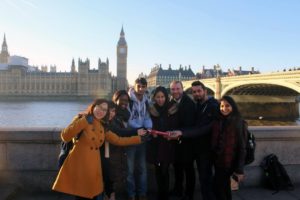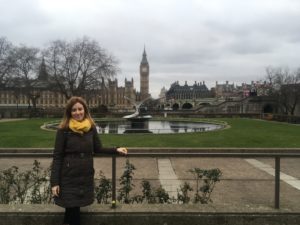10th August 2017
Would you like to study in the UK?
Have you heard about Chevening? It’s the UK’s world-beating scholarship programme for international students. It allows you to study for a Masters degree of your choice at any university in the UK. You do the work, and we cover the costs, including your tuition fees and travel costs. We even pay for your living expenses!
The UK’s higher education system is one of the best in the world. 59 current heads of state or government studied in the UK, which is more than any other country. Three UK universities are ranked in the top ten globally, with Oxford University – where I took my undergraduate degree – currently ranked as the best in the world. From technology to medicine, 76% of research conducted by UK universities is rated as world-leading.
Last year, the UK welcomed over 1900 Chevening scholars from 160 countries, including 12 students from BiH. They studied a whole range of courses, including law, finance, tourism, international relations and computer science, at universities including Oxford, UCL, King’s College London, Glasgow, Aston and Durham.

Almost everyone has an amazing time. Alongside their academic studies, Chevening scholars have the opportunity to build a global network and to enjoy the culture of the UK.

Once you graduate, you join a network of 46,000 Chevening alumni from around the world. Chevening scholars have an excellent record of becoming global leaders in a vast range of fields, including politics, business, the media, civil society, science and technology, and academia. Chevening alumni in BiH include President Mladen Ivanic, Almir Jazvin, the Managing Director of Prevent BiH, Judge Bozidarka Dodik and Zenit Djozic of Top Lista Nadrealista.

Sounds interesting? It gets better. We used to offer just three scholarships a year, but now we can pay for at least nine. In the past two years, however, we have been able to offer even more. Hence, we had 12 Chevening scholars from BiH last year.
We’re looking for people with a strong academic background, and demonstrable leadership potential who are committed to creating positive change in BiH. Chevening is aimed at people who are at a mid-point in their careers. As well as an undergraduate or existing Masters degree, you need at least two years’ professional experience in your chosen field and, of course, a good grasp of the English language.

What does the UK get out of this? We’re not looking to take talent from BiH; we want to nurture it. We want to see future leaders in BiH in all fields – politics, business, civil society or the arts – who have studied in the UK. That’s why all successful applicants must commit to returning to BiH for at least two years after completing their course.
If you would like to know more, then visit the website at www.chevening.org, or contact Mihra Terzić at the British Embassy (britemba@bih.net.ba). The deadline for applications for the 2018/19 academic year is 7 November, so don’t lose time. Start your application immediately. Contact universities sooner rather than later. Set your three course choices. Schedule your English language test. And check with your employer the options for a year off. We look forward to hearing from you, and to you joining the Chevening global network!
Wow I love this opportunity but I am already studying my masters in my country South Africa
Studying Master of scince
I see it as an amassing opportunity, especially suitable for guys from undeveloped countries such Bosnia is. If I were not a bit over the hill, and if there were not some other personal reasons which deter me, I would try to get selected.
Thanks,
Regards,
e2e4